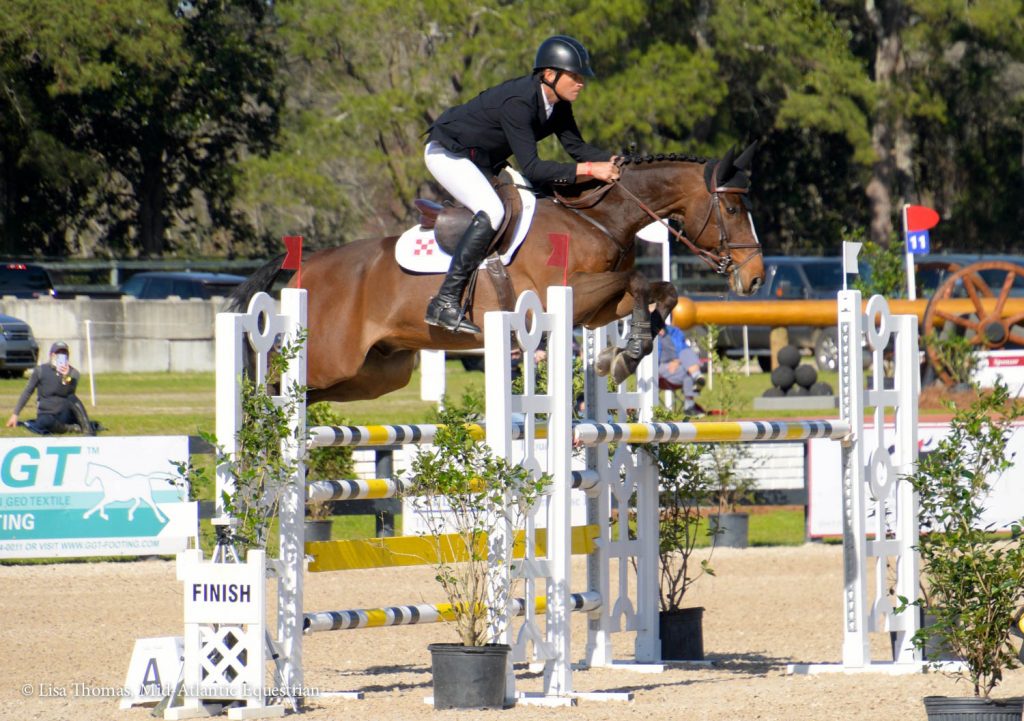Boyd Martin, Olympian and International eventer, dropped in for a meet and greet with LubriSyn at the Secretariat Center before competing at the American Eventing Championships in Lexington, Kentucky.
“Thank you LubriSyn for having me here. It’s a great product that I’ve been using for awhile. It’s definitely changed my career and I really appreciate being here and I’m very thankful to everyone coming along today.”
What was your experience at the Tokyo Olympics?
“Tokyo was an Olympics like no other. It was a hard one to get ready for, just because it got cancelled in 2020. You have your sight set on the Olympic Games. In the beginning of 2020 I really thought I had a good shot. I did really well at Kentucky the year before and won the big contest at the end of 2019. I thought I was in sizzling form and was ready to strike and then they cancelled the event. So, obviously that moment sort of rattles you a little bit, wondering if it was going to run or not. Lucky for us, in 2021 Kentucky 3-day event managed to run their event in the middle of a Covid crisis, thanks to a lot of mega-supporters. That sort of Kentucky 3-day event is a big sort of selection event. I managed to crash and burn and fall off my top horse, Tsetserleg, which at the time I thought, “Oh, no! Can’t be happening!” And then I did really really well with a horse that was not even on the radar called On Cue. And then I had a horse called Luke 140 win a Jersey 3-day event at the 4-star. So I actually got picked on Luke, sadly he got an injury leading up to the Olympics so they selected me on Thomas.
“Tokyo was tough because to get to Tokyo we had to quarantine in Germany. So we had to fly the whole American team over along with all the reserve riders to Aachen, Germany. We had to train there for 2 weeks then they put the team and the reserve horses on another flight and flew around the other side of the world to Tokyo. We arrived in Tokyo and it was so hot. Take your hottest day in America that you’ve experienced and that was a normal day, so humid.
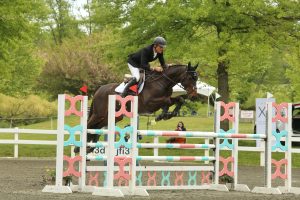
Photo Credits: Amber Heintzberger
“The competition itself was unbelievable, very memorable. If you could imagine this massive stadium with seating as high as you can see without one person spectating. So it was weird, because you’re getting ready for your event and part of you is nervous as hell, because millions of people are watching around the world and you’ve been focused on this one competition and part of it also felt like you were just at a schooling show with no one watching, you know. So it was a little bit of a mixed emotion.
“My horse Thomas, I really went there thinking that I had a chance of getting right in there and being successful. He had won some big events around the world, he had placed second here at Kentucky. I went over there thinking that I was in the hunt. It was just one of those competitions for me and Thomas that just didn’t fall into place. Practiced his dressage test over and over and over again and had days where we went to dressage shows and ran through the test. He was brilliant in the dressage, and then on the dressage day we had just a couple little mistakes which was just so uncharacteristic. I look back on it and think, ‘Did I do something wrong?’ or, ‘Did I get nervous?’ I just really think that my preparation was good and I’ve trained hard and sometimes it just doesn’t come off. If I could’ve done the test the very next day it could’ve been a whole different test.
“Cross country, it was a really really tough course. I was the last of the Americans to go, it was about 11 o’clock in the morning by the time I went, the first horse went out about 6:30. By the time I went it was about 110 degrees. I give credit to my little horse, he just went like a champion. I’ve never seen him so hot, he was just absolutely panting like a dog at the end and we were both dripping with sweat, but we went clear. The show jumping was the next day, we had two rounds of jumping. The first round he was brilliant, we had one pole down. It was a tough course and the show jumping would be our weaker phase. By the time we pulled him out for the second round he was just empty. He was just tired. In the warm up I felt like he was fatigued a bit, and then obviously the jumping course was massive and we ended up having a couple of rails down in the last round. So that was a bit sad.
“Going home, I felt like I had given my best, I pushed, worked hard, trained hard, I felt like my horse gave everything he got. The result wasn’t what I dreamt of, but at the same time I feel like I gave my best. Sort of like that mixed feeling. I couldn’t have tried harder, it is what it is. I felt like I rode pretty good, the horse tried hard, it just wasn’t a contest that worked out well for us.”
How do you stay motivated and not burn out or let the off days get to you?
“The sport of horses, doesn’t matter what horse discipline you do, it’s a long career. If I was a sprinter or a boxer or a basketball player, I’d be retired now. You’ve just got to stay at your best for a small window. With horses, this career drags out for 20, 30, 40 years if you’re pretty good. It’s an interesting debate, how do you stay motivated, inspired and hungry to get better and loving it?
“First thing I’d say, it doesn’t matter what job you do there’s parts of your life where you go to do stuff you don’t want to do. Everyday I have to do stuff that I don’t feel like doing. I go to a competition and get home at one o’clock in the morning and get up at the crack of dawn and get back into it. I’d much rather lie in bed, but to be good and great at this, I know that if I sit around and take a day off that the horses I’m supposed to ride that day don’t get trained.
“I think when someone says, ‘I want to go to the Olympics,’ if you base your happiness on going to the Olympics, the chances of you going to the Olympics are very small. Like 3 people every 4 years get to go to the Olympics. I’ve seen it alot. People base their happiness or their success off that one event and the reality is there’s only a very small percentage of people who are going to pull that off. A lot of it’s timing too, whether you’ve got the great horse and they’re in form and healthy at the moment. I think when you’re looking at horses you’ve got to find happiness or success through what I call ‘The Journey.’
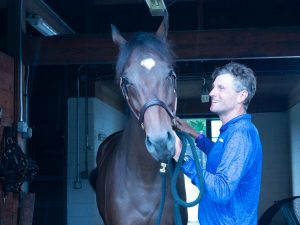
“I love the camaraderie at our barn, I think I would be useless if I was the only person riding at our stable. I love that we have like 60 or 70 horses working at our farm every day, different riders and young people who work for me and you sort of push each other along. I truly love training horses. Working with a rugged 3-year-old, and getting on it for the first time and then six months later teaching it to jump its first cross rail and then 6 months later getting it around to beginner novice. I love that journey of taking a horse on. I love competition. This event we’re at here, the AEC, I get here and I just rub my hands together, I just love the fact that we’re competing against each other. I get a real thrill and a kick out of that.
“But remember, there are days where you’re in pain, you’re sick, it’s pouring with rain, I’m tired as hell and to be really really good you have to push yourself on those days. If you put your hands up and are like, ‘I don’t feel like doing it,’ you aren’t going to be a champion. That’s with any sport, I think you’ve got to understand that there’s days where it’s awesome and there’s days where it sucks. If you wanna be good at this you’ve got to push through those moments knowing that there’s the enjoyment of competition, or the development of the horses. I’d like to tell you that I love it every single moment, but it’s not true.
“I think part of it also, is making that commitment and saying this is what I’m going to do and I’m all in. That’s the part I see a little bit, sort of the half doing it and half not doing it. You’re competing against people that are living, breathing, eating horses. In the sense of that’s all they think about, that’s all they’re doing, it’s 7 days a week. That’s the person you’re competing against. If you’re half doing it and not riding when you’re sick or it’s cold and windy, you’re going to get slaughtered when you compete against these other people that are all in.”
At what age did you compete in your first horse trial?
“I’d say about 13 years old. I’ll never forget it actually, I drive past it when I go back to Australia. I had a gray pony that was 13.2 and his name was Willy, his competition name was Will He Do It. We entered the St. Ives one day event. I remember mom and dad drove me up there in the float, the two horse tagalong float. Did an atrocious dressage, then in the cross country I fell off twice. And every time I fell off the pony ran all the way back to the hay at the trailer and I had to run on foot and get on him. I fell off once early, and of course once at the water jump. I still finished, got back on. And then in the show jumping I fell off once. My first event I think my score was 380. Sad, isn’t it? You’re not even allowed to fall off and get back on now. So I had 3 falls in the first competition. I enjoyed it though. It was a lot of exercise when you’ve got to go catch the horse.”
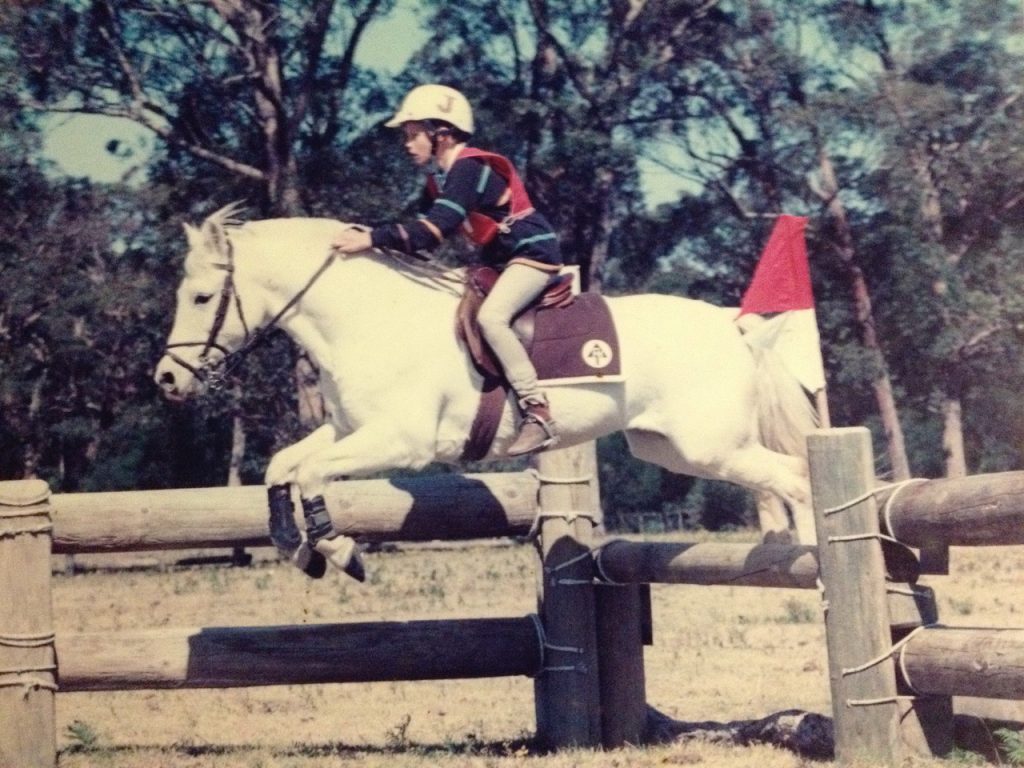
What did you do to prepare your horse for such a long journey in Tokyo?
“The fitness was a little bit of a debacle because America was at a disadvantage with having to fly the horses to Germany, stay there for two weeks and then fly them to Tokyo. Every other country could fly them straight to Tokyo. So we had to plan for our horses to be Olympic fit 3 weeks before the competition started because the galloping in Germany and the galloping in Japan wasn’t really fitness, it was more just getting the horses sweating a bit. It was hard to actually put a proper fitness work in them. On top of that, the other debacle for us was that we’re in the middle of a hot summer preparing and getting the horses fit for the Olympics. The best fitness tool we have in Pennsylvania is the grass gallops up the long hills. You really have to time it when it rains and the ground’s good and go the next day, and it didn’t rain for awhile. I’ve got a track at my place, and we had to gallop on the track. Basically trying to get the horses as fit as you can without injuring them in the middle of summer is a little bit tricky. In the spring it’s quite easy because there’s good rainfall. I do think it disadvantaged the American horses not being able to gallop properly the month before the competition.
“Fitness-wise I do a lot of cross training with the horses. Obviously, we’ve got our fast gallops which we do every 5 or 6 days depending on their schedule. Then the horses do a lot of hacking. They have a rider walking them for about an hour every day. Then we have a conditioning pond where we have the horses walk in to water up to their chests twice a week for 20 minutes which is more probably strength and a little bit of cardio, gets them puffing a bit. And then we’ve got our dressage, cross country, show jumping training plus an event to get them ready.
“I’m lucky though, the horse I’ve got, Thomas, is a pure athlete. Getting him fit is easy enough. So I had him fit enough at the Olympics.”
Who trains your horses at home when you’re away?
“I’m away a fair bit, with competitions. Here in Kentucky [at the AEC] I’m away four days. I’m lucky, my wife rides on the dressage horses, the good ones, it’s hard to convince her to do too many. Then I have 4 riders that have been with me, some of them have been with me nearly nine years. So they know the gallops. They’re very very good dressage riders. Then for the upper level horses, that are further along in their career, I’ve got an Irish guy that I’m very good friends with that’s a pure show jumper that would come over and help me out and jump a couple of my top horses once a week.”
What kind of alternative therapies do you use to keep you and your horses, not only in shape, but feeling your best?
“I’ve been injured and hurt more times than you can think of. In a sport where you’re galloping horses and jumping year after year after year. Last year I had 4 surgeries. Tore my groin twice and I had hip surgery. At the moment I’ve got a rod in my right leg, screws in my right ankle, a plate in my right arm and plates in both collarbones. It’s hard on your body.
“Long story short, back when I was in my 20’s and early 30’s it was just not a problem. I could recover well, I could ride a bit injured, I’d be fine. And then basically I got to about 35 and then the old body started to give out on me. I’d get my back injected, it was horrible. LubriSyn is an absolute game changer for joint care. LubriSyn’s got 2 jobs, it regenerates and has helped me recover a bit and then on top of that it’s a preventative supplement.
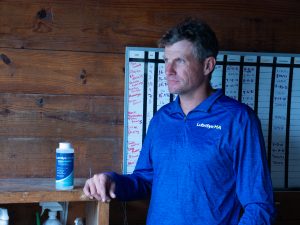
“The horses are on a strict diet of top quality feed, we have the theraplate, we have a body work lady who comes in and massages them, obviously top notch supplements in their diet, the best blacksmith, the best vets, you name it, we do everything we can. I started doing a bit the same for myself about 5 years ago.
“Longevity is key here, to be really really good it just takes years and years and years of training and improvement and staying hungry to get better. It’s amazing when you go to the Olympic Games the age of the athletes is 40’s, 50’s, even the guy that won bronze was in his 60’s. It’s such a wise person’s game. You’ve got to stay healthy, strong and fit to keep going well. I’m also millions and millions and millions of dollars in debt, so I have to keep going here otherwise I’ll have a few loan sharks chasing me.
“I get in the ice baths when I come down with inflammation. So basically, I’ve got an infrared sauna and a steam sauna in my house. When I’m feeling sore or tired, I’d go in that for 20 minutes then I’d jump in the ice bath for somewhere between 4 to 8 minutes. I did it to reduce inflammation, we basically do it to the horses’ legs, you go up to your neck and it’s horribly unpleasant. I think it also builds your mind a little bit. In competition you have to learn to control your emotions, in the sense that there’s moments where you’re nervous as hell and you’ve got to take a deep breath and not freak out. It’s the same as getting in an ice bath. The first 30 seconds you just want to go, “AHHH!” and you need to learn to take a deep breath and accept being uncomfortable. You actually can train your mind to, in moments where everything is very very uncomfortable and you’re nervous, take a deep breath and accept it.”
What makes thoroughbreds such a great breed to compete in your sport?
“Thoroughbreds, to me, they’re the king of all breeds. I’ve been very very lucky to compete with thoroughbreds for America at the World Championships in 2010 on a thoroughbred called Neville Bardos, who I bought as a 3-year-old in Australia straight off the track. Then at the Rio Olympics I rode an American thoroughbred that was bred down the road here [Lexington, Kentucky], that came from an adoption program, called Blackfoot Mystery.
“To me the thoroughbreds are a fantastic breed of horse for eventing. Obviously they’ve got the speed and the stamina which is the core of our sport, the cross country. I think the great thing in America is that there’s so many thoroughbreds born to race and there’s so many that are too slow to race. There’s an abundance of top class horses out there to change their career.
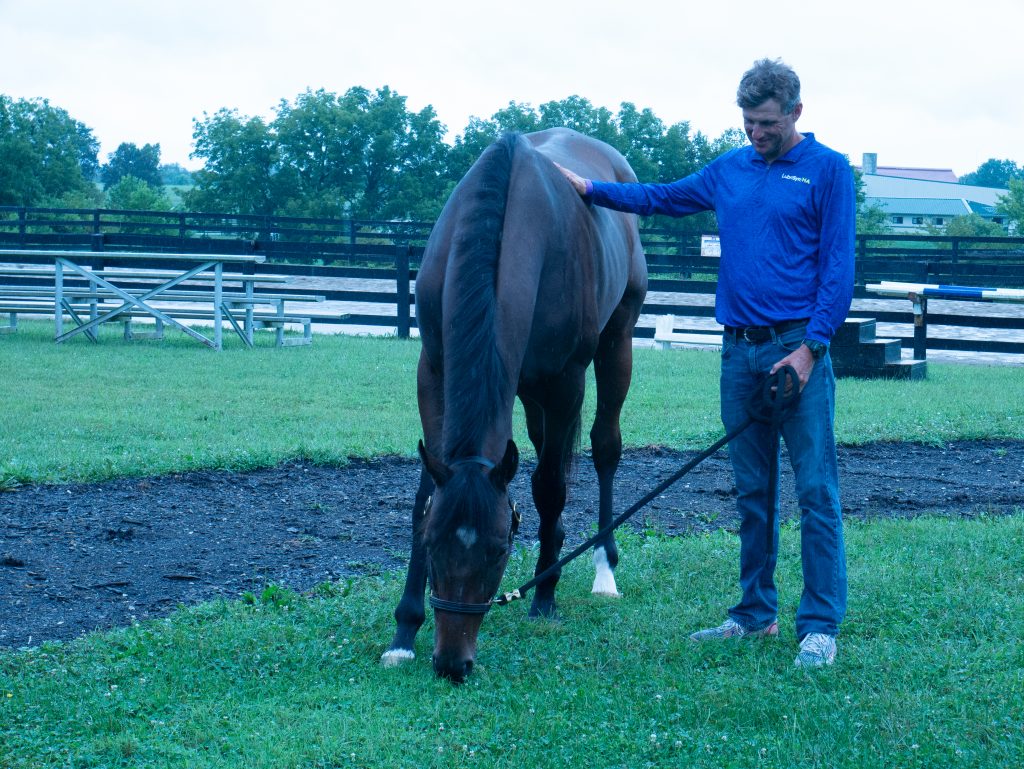
“Selecting a thoroughbred you’ve really got to be sure you’ve picked the right one that’s suited to you and the sport. Trying to find a bigger, taller, rangier thoroughbred for me, I’m a taller guy, trying to find one that’s got good confirmation, good feet and a thoroughbred that’s got attributes to the sport you want to do. With eventing, a loose moving one is going to be handy for the dressage, if you’ve got the ability to evaluate its jumping ability, that’s critical as well. The great thing about thoroughbreds is that usually once they’re retired from racing, they’re affordable. Anyone who wants to get into eventing or equestrian sports on a budget, that’s your ticket to get started. In Australia, that’s how I started my business of buying slow race horses and putting 6 months of the year into them and then selling them on. For anyone who’s trying to start their own equestrian career, it’s a very very affordable way to get amongst it and get into the sport.”
What is the best advice you have to give to young riders?
“Two things: If you want to do this, do it. Don’t half do it, if you really want to do this don’t go to university and get an arts degree, you’ve got to 100% in. You can’t dabble in it, you’ve got to be 100% committed to doing it. If you’re sort of half doing it on the side, it never quite works out. You may be pretty good, or have a horse that’s one-off good, but to absolutely want to throw yourself at it, you’ve got to go all in. Don’t half do it. Then, if you can, try and marry someone that’s really wealthy. Or guys here, try and marry a dressage rider, that’s a good career move too. It just helps you get over that hump.”
What do you think it takes to be successful?
- Ambition – you have to want to succeed and be willing to put in the effort to get there. You have to have a good work ethic and have the drive to succeed.
- Emotion – you’ve got to be able to keep your emotions in check and keep your cool when things go wrong.
- Management – you have to be able to manage all of the aspects of your horses care, from farriers to the surface you ride on.
- Selection – from your horse to your coaches and veterinarian, you have to be able to pick the best.
- Natural talent – natural talent can be a good thing, but having the other 4 aspects mean more. Having minimal natural talent but a lot of ambition means way more than having natural talent but no drive.

